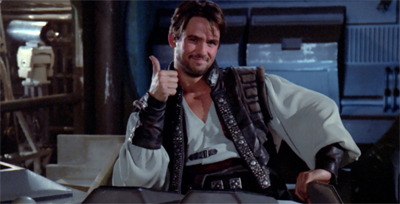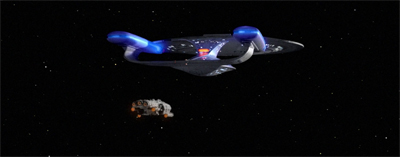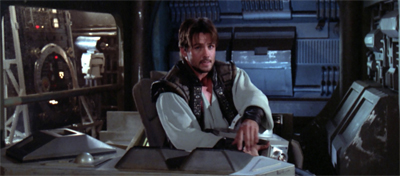To celebrate the twenty-fifth anniversary of Star Trek: The Next Generation, and also next year’s release of Star Trek: Into Darkness, I’m taking a look at the recent blu ray release of the first season (and a tiny bit of the second), episode-by-episode. Check back daily for the latest review.
Well, I’m not sure if you can call two solid episodes in succession a “streak” or a “roll”, but Where Silence Has Lease and Elementary, Dear Data were two hours of television that demonstrated how far the second season of Star Trek: The Next Generation had come since its rocky first season. However, it appears that the two very good episodes in a row did not represent a sudden change in direction and did not assure consistency. The Outrageous Okona is a bad episode, by just about any measure. It’s not necessarily as offensive as Angel One or Code of Honour, but it is quite painful to watch.
Unlike a lot of the bungled “message” shows in the first season that contained misjudged ideas or offensive elements, The Outrageous Okona is merely a terribly written and unfunny mess of an episode that simply gnaws at the viewer.
“Happy families are all alike,” the opening line of Anna Karenina tells us, “every unhappy family is unhappy in its own way.” You could almost argue something similar about Star Trek episodes. Those that work typically understand the franchise’s underlying philosophy, value system, characters and the way that these are combined to tell compelling stories. Good Star Trek episodes are, generally, alike in that manner. On the other hand, quite a few bad episodes are bad in their own relatively unique way.
You have, for example, episodes that are bad because of execution. Code of Honour was never going to be a classic episode, but casting all the Ligonians as black had somewhat unfortunate connotations. Some are terrible because they are inherently prejudiced, like Angel One. Others don’t take account of how times have changed, like Justice. Some are one-dimensional massage shows that could be delivered as earnest lectures that lack nuance, like Arsenal of Freedom. Some lack respect for different ideologies, like The Last Outpost.
To be fair, The Outrageous Okona isn’t bad for any of those fundamental reasons, and perhaps that is evidence that the show is (gradually) improving. That said this is the year of The Next Generation that gave us Up the Long Ladder, so let’s not get too excited about that. At least, though, the sexism in The Outrageous Okona is explicitly intended as such. When a father shows up demanding that Okona marry his daughter, Picard and the bridge crew roll their eyes at the suggestion that being a single mother is somehow something of which a woman should be ashamed.
As Troi explains, “We are dealing with ancient codes involving procreation. While they may be meaningless to us, to Debin they represent his honour.” I do like that the crew doesn’t quite lecture Debin on this point, sparing us the moral superiority of Lonely Among Us, but it is nice to see that those somewhat outdated views are not taken at face value, and that the show is willing to paint a culture as brazenly sexist without being sexist in its own way. We’re a long way from Angel One.
The problems with The Outrageous Okona stem from the eponymous guest star and bad writing. The Outrageous Okona reads like particularly bad fan fiction where a new character shows up, the main cast seem to exist to tell us how great they are, and then they dispense important and heart-felt advice to the crew. I’m surprised that the script was written by Burton Armus. I’d almost expect it to have been written by a writer named O’Connor, brazenly inserting himself into the narrative.
Okay, let’s not be unfair here. Okona clearly isn’t meant to be the author standing in, thinking how cool it would be if he could interact with the main cast. Instead, Okona seems rather pointedly modelled after another iconic science-fiction character, running a heap-of-junk ship, known as a scoundrel and interacting with an authority known to fly far more sterile ships than his own. Okona is pretty much Han Solo, right down to his outfit. It has been changed a bit, possibly to avoid a lawsuit, but it’s still a white shirt with a black waistcoat and pants.
That’s not a fatal flaw. A crossover featuring Han Solo interacting with the straight-laced Picard might be a little fun. I’d actually love to see Harrison Ford on the Enterprise. However, despite the obvious homage and the clear modelling of Okona after Solo, the character is nowhere near as compelling, because he’s nowhere near as well-written. For one thing, it’s incredibly lazy to tell us that the character is bad-ass by having our regular crew spend half the episode talking about how bad-ass they are.
I remember a great episode of The Simpsons when Homer landed the part of the irritating Poochie the Dog. When it became clear that Poockie was in need of an overhaul, Homer constructed his own list of suggestions on how to make the character cool: “Two, whenever Poochie’s not onscreen, all the other characters should be asking ‘Where’s Poochie?'” It’s bad writing 101, and The Outrageous Okona just walks right into it.
The opening scene has Troi serve, rather clunkily, as the writer’s voice. “His emotions suggest that he’s mischievous, irreverent and somewhat brazen. The word that seems to best describe him is rogue.” Wow! It’s like she attended the pitch meeting! “Well, Okona is an interesting man, certainly,” Riker tells Wesley. “We’ve seen how he handles his ship. Apparently he knows how to handle people as well.” He adds, “He’s a man who lives his life by his own rules. He does what he does by choice. By his choice.” Man, even Riker is swooning for this guy.
Somewhat creepily, the show even point out how explicitly sexual Okona is. “Mister Okona seems to have excellent vision as well as a healthy libido,” Riker notes, and nobody adds “takes one to know one”, because everybody’s forgotten Riker was supposed to be the show’s charming rogue. When Picard is looking for him, Worf notes, “Captain Okona has not responded, sir. He’s been reported in three different crew quarters.”
However, this doesn’t quite work. As I noted when discussing Justice, times have changed since Kirk perfected the art of picking up space ladies with nothing but a wink and a grin. The Next Generation is a much more sterile show than the original Star Trek ever was. It’s a lot cleaner and relatively sexless. Even Riker – the resident “Kirk” archetype – doesn’t seem to get too much action. So when all we see is Okona flirting terribly and beautiful women sitting on their beds waiting for him (fully clothed in eighties future wear), it seems more creepy than exciting or sexual.
There’s no passion or raw energy to Okona’s flirtations, and part of this is because the female characters are so underdeveloped. None of them seem like characters. Teri Hatcher appears on the show merely so she can demonstrate what a “rogue” this Okona fellow must be. She gets no characterisation, no development. She’s literally there to welcome Okona into her room for a night of lukewarm passion.
As an aside, I find it a little unnerving that Okona has been “reported” in several crew quarters. I know the show is sterile, but it not only destroys the somewhat romantic idea of a lover “sneaking” into their partner’s room, it also suggests that Enterprise keeps track of these couplings not through idle gossip or casual conversation, but through meticulous record-keeping. Big Brother is watching, and it is controlled by Patrick Stewart. Which, I suppose, isn’t the worst option.
Of course, Okona’s lack of sexual charisma isn’t unexpected on The Next Generation, so it would be easy enough to forgive were it the show’s only weakness. Instead, Okona doesn’t seem anything like the character the show is so desperately trying to convince us that he is. “Because it relegates me to cargo carrying rather than the grand explorations you enjoy,” he explains, “I’m forced to add a measure of flamboyancy and a zest to the doldrum of my existence.” He seems like that boring guy at work who insists that he really lives an exciting life, except somehow he has convinced the Enterprise crew to buy into his delusions.
The Outrageous Okona really just makes Okona seem rather toothless. He’s not really a “rogue.” I’ve noted before that occasionally The Next Generation can be too clean-cut, and that it tends to avoid conflict or nuance when it’s at its weakest points. The Outrageous Okona demonstrates that. Okona is meant to be a charming rogue, but he seems just as by-the-book as Picard and his crew. When the two factions come looking for him, his first response is to go crying to Picard.
He’s downright charming and helpful throughout the episode, and the big reveal is that he’s even more charming and helpful. Even when he refuses to come completely clean, there’s never any real friction between Okona and Picard, and there’s never any sense that Okona is playing by his own rules, or anything like that. He isn’t a thief and he isn’t a deadbeat father. He’s pretty much an all-round perfect guy.
Well, if he didn’t grate so much. Bill Campell is a charming actor (he was on the shortlist for the part of Riker, after all), but he’s saddled with a terrible script. “Captain Okona at your service, sir,” he introduces himself. “There’s no need for your phasers, Captain. I’m harmless and not quite yet ready for mercy killing.” The episode’s failed attempts at humour are painful with Okona, but they become more serious in the subplot. Incidentally, the script also clumsily establishes his libido in the most awkward manner possible. In the middle of a crisis, he pauses to ask, “Is that woman’s voice I hear?”
Indeed, Okona is such an annoying writer’s pet character that he can only be trumped by Wesley. Wesley is, as we saw in The Naked Now, very clearly a clumsy attempt to write an “oh so special” teen character to help attract teenage viewers. Like Okona, we’re supposed to think Wesley is great, but he’s really terrible. However, Wesley is a regular on the show, so his writer-imposed awesomeness surpasses Okona’s writer-imposed awesomeness. So it’s Wesley who convinces Okona to finally set things right.
While I’m discussing this plot, I should also note that – with the exception of Campbell – most of the guest cast involved are terrible. No actor can make this sound like Shakespeare, but the two young characters are played by truly diabolical actors. Rosalind E. Ingledew is absolutely terrible as Yanar, and Kieran Mulroney is almost as bad as Benzan. The script was always going to be painful, but watching the scenes between the characters unfold made me resist the urge to just skip the episode.
This brings us neatly to the secondary plot, which is also pretty painful. All it has going for it is Brent Spiner, really. It’s great to see Data with a cigar, particularly flexing his arms in and out in a neat impersonation of a stand-up comedian. Indeed, the sight of an android in a tuxedo is quite wonderful. Unfortunately, that’s about the best I can say about this subplot, which features Joe Piscopo as “Mr. Comic” attempting to teach Data how to be funny.
Okay, there is one other nice moment, and it serves to illustrate just how sterile The Next Generation is. (I promise I will try not to use the word “sterile” to describe the show at least until Up the Long Ladder.) Asking the computer to produce the funniest comedian in the history of the universe, the computer suggests, “Twenty third century Stan Orega specialised in jokes about quantum mathematics.” I bet he was a killer on the Enterprise.
The problem with this subplot is that it teaches Data a moral that should be self-evident, even to him. Indeed, “Mr. Comic” even states it in his introductory scene. When Data asks him what is funny, he replies, “Well, I think whatever makes you laugh is funny.” It’s a simple idea, but it’s entirely true. There’s absolutely no point in building an episode around a concept that can be expressed so simply and so beautifully in a single line of dialogue.
And yet we’re forced to watch Data try to be funny for a significant portion of the episode, even though we know from the outset that he must learn that – spoiler! – humour is subjective. You could argue that the plot is worthwhile if the journey is entertaining, but the script just isn’t funny enough to keep us engaged. The Outrageous Okona is just a dull script. The Next Generation could do comedy quite well. For example, John DeLancie might be the most consistently funniest guest star in Star Trek, and both Brent Spiner and Michael Dorn have superb comic timing. However, this script is just clunky.
It’s telling that the funniest line of the episode doesn’t belong to Okona or to Data or to Guinan or to “Mr. Comic.” Instead, it’s a short piece of dialogue given to Picard, and it only really works because Patrick Stewart is still one of the best actors to ever appear in the franchise. Confronted by a vastly inferior ship with weapons that won’t even breach the hull, Picard orders, “Drop main shields as well.” When Riker asks why, Picard wryly replies, “In case we decide to surrender to them, Number One.” It’s a nice moment, in character and delivered fantastically by Stewart.
The Outrageous Okona is a pretty terrible episode of Star Trek. I don’t think I’d class it with The Child, Up the Long Ladder or Shades of Grey, but it is downright painful at times. It’s an example of how Star Trek relies on the script first-and-foremost. A fantastic cast and a half-decent guest star are nothing with a terrible piece of writing to perform. The Outrageous Okona might not be as offensive as some of the terrible episodes we’ve had to sit through, it is pretty bad on its own terms.
Read our reviews of the second season of Star Trek: The Next Generation:
- The Child
- Supplemental: Phase II (1978) – The Child
- Where Silence Has Lease
- Elementary, Dear Data
- Supplemental: Embrace the Wolf
- The Outrageous Okona
- Loud as a Whisper
- The Schizoid Man
- Unnatural Selection
- Supplemental: Deep Space Nine (Marvel Comics) #3-4 – The Cancer Within
- A Matter of Honour
- The Measure of a Man
- Supplemental: Myriad Universes – Echoes and Refractions: Brave New World by Chris Roberson
- Supplemental: The Measure of a Man (Extended Cut)
- The Dauphin
- Supplemental: Masks by John Vornholt
- Contagion
- The Royale
- Time Squared
- The Icarus Factor
- Supplemental: The Lost Era – Deny Thy Father by Jeff Mariotte
- Supplemental: (DC Comics) Annual #2 – Thin Ice
- Pen Pals
- Q Who?
- Samaritan Snare
- Up the Long Ladder
- Manhunt
- The Emissary
- Peak Performance
- Shades of Grey
Filed under: The Next Generation | Tagged: Angel One, Burton Armus, Data, Deanna Troi, Debin, Encounter at Farpoint, Han Solo, jean-luc picard, Last Outpost, Naked Now, Outrageous Okona, patrick stewart, picard, Star Trek Next Generation, star trek: the original series, Starfleet ranks and insignia, StarTrek, Wesley, Wesley Crusher, Where Silence Has Lease, William Riker |

































Back in the day, this episode–really, *Joe Piscopo* was the funniest comic they could get?!–inspired my own take. Since the ‘holodeck misfires with potentially lethal results’ thing was already becoming a bit of a cliche, I saw Data instead bringing the Three Stooges into existence to teach him comedy. However, after the usual holodeck mishap, the Stooges manage to leave it and roam the ship. Donning stolen uniforms and being mistaken for the “three warp technicians” Geordi has been expecting, they promise “You won’t recognize the place” when Geordi goes to attend a staff meeting. Later Worf shows up, sees the wreck of the engine room, and chases the Stooges around, threatening to kill them.
The only problem I really had with this scenario is that, inevitably, the only logical ending was the complete destruction of the ship.
But it’s okay – because it all be revealed to be inside the holodeck itself! Mind-screw!
Although that would mean trading Ship in a Bottle for your episode, I think I could live with it!
Reblogged this on cienciayconcienciaccd.
Kieran Mulroney was the guy that chided Costanza for “double-dipping” his chip (among other things). He also wrote the second Robert Downey Jr Sherlock Holmes movie, so there’s almost a connection there, since the previous episode featured Holmes.